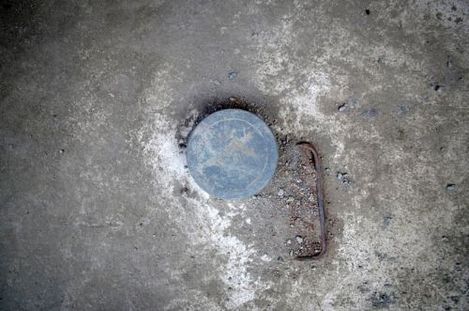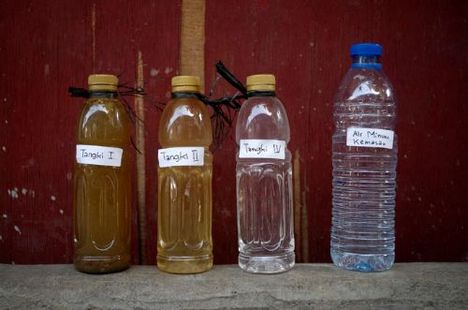Sanitation as ‘Imagined Order’: Knowledge Production of Urban Sanitation Infrastructures in Jakarta

Photo: Roy Rubianto

Photo: Roy Rubianto
Context and Aim
In this research, using the case study of Jakarta, I aim to examine the production of sanitation knowledge in the South and the development of urban sanitation infrastructures that constitute the ‘imagined order’, which is embedded in the material world, shapes our desire, and is intersubjective (Harari, 2014). The imagined order is then contrasted against the production of urban sanitation infrastructures since the megapolis has only 2% coverage of sewerage connected to the centralised wastewater treatment plant (WWTP) and the majority of residents, around 60-70%, relies on decentralised septic tank, often poorly designed and constructed.
Central to the imagined order is mass cooperation networks based on belief in shared myths, which are sustained and proliferated through education (Harari, 2014), in this case knowledge production by technical university. The production of postcolonial knowledge of sanitation in Indonesia can be traced to the oldest higher education institution created by the Dutch colonial government, Bandung Institute of Technology (ITB). Formerly Technische Hogeschool Bandoeng (THB), the embryo was Sub Afdeling der Sanitaire (Sub Department of Sanitary) from the only faculty available at that time Fakulteit der Technische Wetenscap (Faculty of Technical Science). The production of sanitation knowledge from ITB is three-folds. First, formally, as the oldest institution, the lecturers institutionalise the knowledge via teaching to the students (engineers, planners, and architects) who later on found other technical faculties/universities or other higher education institutions. Second, the graduates then politically involved in the state policy making, where they are concentrated in the Ministry of National Development Planning and the Ministry of Public Works and People Housing, two state institutions that are largely responsible for the development of (urban) infrastructures. Third, the graduates are employed in the construction contractors and consultant companies that manage the actual implementation of such infrastructural projects. All to all, the human actors in those three processes interact with global actors (i.e. multilateral finance institutions, Western universities, contractors, etc) as well as non-human actors (i.e. Northern theories, goods from Northern firms, etc).
Toward Vernacular Theorizing of Urban Infrastructures
To trace the knowledge production on urban sanitation infrastructures, I suggest searching the knowledge cycle/diffusion within and beyond technical university. The term ‘cycle/diffusion’ is derived from vernacular Indonesian expression ‘daur/baur’ which reifies the sequential, circularizing, and ‘distributedness’ processes of knowledge production. Following the vernacular theorizing, I further exercise and rework the processes of knowledge production mentioned above into three research themes, and after that propose the research strategy in the next sections.
Knowledge Cycle/Diffusion Within and Beyond Technical University
This dissertation posits that, in technical university, knowledge about urban sanitation infrastructures has never been solely produced by sanitary/environmental engineering, which are founded and reworked by multiple disciplines of natural science (microbiology, physics, chemistry, geophysics, meteorology) and engineering (mechanical engineering, chemical engineering, civil engineering). Rather, they are cycled/diffused at different scale to different disciplines: industrial and interior design touch the most personal surface between human and the artefacts; architecture relates those paraphernalia with human settlement; planning collaborates the interrelationship of multiple parts of infrastructures at larger scale, urban or even national level. It is at the interface of those disciplines that this study invests its interest to widen the horizon of urban (sanitation) infrastructures where the realms of art & design and science & technology are blurred and at the same time enact material-semiotic transformation (Harwood, 2011; Larkin, 2013) hence the performative function of knowledge production that “[it] is never a purely descriptive or analytical practice, but has performative effects, that is, the capacity to transform the objects and subjects” (Farias & Blok, 2015: 4).
(De)Materialisation of Planning Documents and the Perpetuity (‘Endlessness‘) of Urban Sanitation Infrastructure Projects
Consider the epistemic network (of engineers, architects, and planners) informed by necessary sanitation knowledge, why then the perpetual efforts to realise urban infrastructure ideal are stunted? Does this straightforwardly and simply imply that epistemic networks are both diffusing knowledge and preserving the corrupt patron-client relations? (Hull, 2012; Larkin 2013). To respond to these enigmas, I then seek to investigate further the iterative knowledge cycle/diffusion beyond technical university: from technical university to state institutions to private companies to civil society group, and penultimately to this research, that serves to ‘visibilize’ the infrastructure assemblage and fleshes out the knowledge production processes, from which the (de)materialisation of planning documents and the endlessness of urban sanitation infrastructure projects can be radically dissected and understood better.
Disrupting the Imagined Order: Rethinking the Theory-Practice Gap and the Global-Local Interface
After researching rather local/national themes, in this part I aim to anthologize the urban sanitation knowledge production processes by disrupting the imagined order through rethinking the theory-practice gap and the global-local interface. To those ends, I will extract the knowledge of knowledge from the previous two research themes where the dissonance of theory and practice is a fertile ground to furthermore problematize the global-local interface. The disruption is a performative rupture of the assemblages of after-postcolonial states, multilateral development banks, internationalising technical universities, and other actors participated in the creation of imagined order in form of urban sanitation infrastructures.
Research Strategy
In order to develop the theoretical/conceptual framework, I will then synthesize eclectic theories from Deleuzian rhizome and the urban assemblages (Farias, 2011), the notion of ‘people as infrastructure’ (Simone, 2011), the everyday urbanism (Roy, 2009) and the provincialized urban theory (Oldfield & Parnell, 2014). The theoretical/conceptual frameworks then will be used to contrast the ‘elite’ sanitation knowledge from ITB with the everyday sanitation practices of Jakarta residents, which constitute the infrastructures.
Following the research themes, there are relevant research sites for institutional ethnography:
- Jakarta city: Internship in four key organizations as follows: the Ministry of Development Planning, the Ministry of Public Works, the Deputy of Spatial and Environmental Planning of Jakarta Provincial Government, and the Jakarta Water Supply Enterprise.
- Bandung city: Within ITB, the technical university that includes interviews with lecturers and observation in their classes/labs/studios, covering the disciplines as follows: environmental engineering, architecture, interior design, urban planning.
- International sites: Technische Universiteit Delft and other possible sites for archival research.
Literature
Blok, Anders & Farías, Ignacio (2016). Urban Cosmopolitics. Agencements, Assemblies, Atmospheres. London, New York: Routledge.
Farías, I. (2011). The politics of urban assemblages. City, 15(3-4), 365-374.
Graham, S., & Marvin, S. (2001). Splintering urbanism: Networked infrastructures, technological mobilities and the urban condition. London: Routledge.
Harari, Y. N. (2015). Sapiens: A brief history of humankind.
Harwood, J. (2011). The Interface: IBM and the Transformation of Corporate Design, 1945-1976. U of Minnesota Press.
Hull, M. S. (2012). Documents and Bureaucracy*. Annual Review of Anthropology, 41, 251-267.
Larkin, Brian. “The politics and poetics of infrastructure.” Annual Review of Anthropology 42 (2013): 327-343.
Oldfield, S., & Parnell, S. (2014). From The South. The Routledge Handbook on Cities of the Global South.
Roy, A. (2009). The 21st-century metropolis: new geographies of theory..Regional Studies, 43(6), 819-830.
Simone, A. (2004). People as infrastructure: intersecting fragments in Johannesburg. Public culture, 16(3), 407-429.